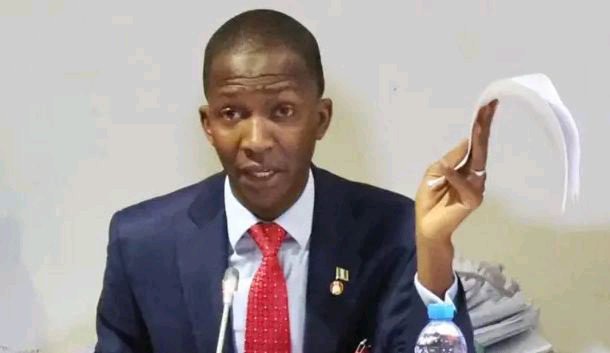A new exposé by former EFCC Chairman, Abdulrasheed Bawa, has uncovered massive corruption in Nigeria’s controversial fuel subsidy regime.
Diaspora Digital Media (DDM) reports that the revelations are contained in Bawa’s newly released book, The Shadow of Loot & Losses: Uncovering Nigeria’s Petroleum Subsidy Fraud, published by CableBooks, an imprint of Cable Media & Publishing Ltd.
The book reveals how billions of naira were drained from Nigeria’s treasury through fraudulent fuel subsidy claims, leveraging ghost importing, forged shipping documents, and systemic collusion.
Bawa, who headed the Economic and Financial Crimes Commission (EFCC) between 2021 and 2023 under President Muhammadu Buhari, describes his work as a blend of investigative documentation and an urgent call for reform.
He draws from his firsthand experience as a lead investigator in the 2012 EFCC probe into subsidy-related fraud, offering a rare insider’s account of one of the largest scandals in Nigeria’s financial history.
According to a statement released by Vic Akinrogunde on behalf of the publishers, Bawa’s book outlines a catalogue of deception by both corporate entities and corrupt public officials.
These included instances where companies received subsidies for fuel that was never imported or for shipments with deliberately inflated volumes.
In many cases, single fuel shipments were used to make multiple claims, often supported by forged documents and manipulated bills of lading.
The manipulation of shipping documents allowed fraudsters to take advantage of fluctuating global oil prices to secure higher payments from the government.
Bawa details how these manipulations enabled racketeers to profit immensely, while the Nigerian people continued to suffer the consequences of fuel scarcity and inflated prices.
He notes that subsidized fuel was frequently diverted to black markets within Nigeria or smuggled across borders to neighbouring countries, where it fetched much higher prices.
“These crimes were enabled by forged documentation, regulatory failure, and entrenched corruption across government and business,” Bawa said.
The book also explores how weak institutional oversight and a lack of political will allowed the fraud to thrive for years, costing the Nigerian economy trillions over time.
Bawa emphasised that the fraudulent subsidy system thrived because of a network of dishonest officials within regulatory bodies, colluding with private firms to plunder public funds.
He stressed that The Shadow of Loot & Losses is more than an exposé, it is a call to action.
“It is a demand for transparency, accountability, and reform in Nigeria’s public finance management, especially in the oil sector,” he stated.
The release of the book comes at a time when Nigeria is still grappling with the aftermath of decades of subsidy mismanagement.
In May 2023, President Bola Tinubu finally announced the end of the fuel subsidy regime.
While the move was lauded by some as necessary, it has also led to increased economic hardship for ordinary Nigerians, as fuel prices surged and inflation escalated.
Observers argue that subsidy removal without robust anti-corruption measures and social safety nets only shifts the burden to the poor, without addressing the foundational issues of waste and fraud.
Bawa’s book adds weight to growing calls for systemic reform and heightened oversight in Nigeria’s oil and gas industry, which remains the backbone of the economy.
He contends that the subsidy system, rather than helping the poor, enriched a small group of politically connected elites who exploited government loopholes.
Among the fraudulent strategies documented in the book are:
- Ghost Importing and Over-Invoicing: Where companies submitted subsidy claims for nonexistent fuel or exaggerated shipment volumes.
- Manipulated Bills of Lading: Shipping documents were altered to reflect higher prices or volumes, increasing subsidy payouts.
- Double Claims on Single Shipments: Some importers used a single fuel cargo to file multiple subsidy claims.
- Diversion and Smuggling: Subsidized fuel meant for domestic use was rerouted to black markets or smuggled out of the country for profit.
Bawa warns that unless reforms are enforced, similar frauds could resurface, even under new subsidy frameworks or other government-funded programs.
The book’s release has sparked widespread discussion among policy analysts, economists, and civil society groups, many of whom have called for the prosecution of those named in previous EFCC investigations.
Despite the exposure of the 2012 scandal and the subsequent protests that rocked the nation when former President Goodluck Jonathan attempted to remove the subsidy, few convictions have been secured.
In that year, mass demonstrations known as “Occupy Nigeria” erupted after the federal government’s decision to eliminate the subsidy, a move that was quickly reversed amid public backlash.
Since then, Nigeria has continued to pour resources into a subsidy scheme described by economists as unsustainable, opaque, and highly susceptible to fraud.
Bawa’s new book reopens the debate, reminding Nigerians that while policy changes are necessary, justice and transparency are equally crucial for long-term recovery.
The author notes that anti-corruption efforts must go beyond surface-level crackdowns and delve into structural changes within institutions.
RovingHeights Bookstore is distributing The Shadow of Loot & Losses nationwide, ensuring wide access for Nigerians eager to understand how public wealth was looted under the guise of subsidy.
With this work, Bawa joins a growing list of former public officials who are using memoirs and publications to expose Nigeria’s deeply entrenched corruption.
Many hope the revelations in the book will not only spark national conversation but lead to meaningful policy shifts and renewed investigations into subsidy-era crimes.
As Nigerians grapple with soaring fuel prices, dwindling revenue, and poor governance, Bawa’s book arrives as a timely reminder of the high cost of impunity, and the urgent need for institutional integrity.







